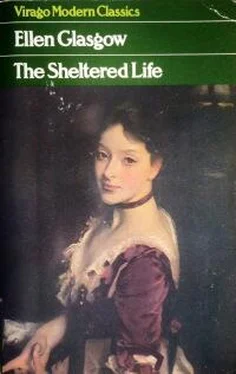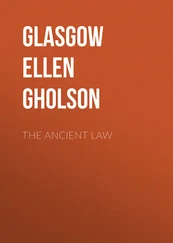Ellen Glasgow - The Sheltered Life
Здесь есть возможность читать онлайн «Ellen Glasgow - The Sheltered Life» весь текст электронной книги совершенно бесплатно (целиком полную версию без сокращений). В некоторых случаях можно слушать аудио, скачать через торрент в формате fb2 и присутствует краткое содержание. Жанр: Классическая проза, на английском языке. Описание произведения, (предисловие) а так же отзывы посетителей доступны на портале библиотеки ЛибКат.
- Название:The Sheltered Life
- Автор:
- Жанр:
- Год:неизвестен
- ISBN:нет данных
- Рейтинг книги:5 / 5. Голосов: 1
-
Избранное:Добавить в избранное
- Отзывы:
-
Ваша оценка:
- 100
- 1
- 2
- 3
- 4
- 5
The Sheltered Life: краткое содержание, описание и аннотация
Предлагаем к чтению аннотацию, описание, краткое содержание или предисловие (зависит от того, что написал сам автор книги «The Sheltered Life»). Если вы не нашли необходимую информацию о книге — напишите в комментариях, мы постараемся отыскать её.
The Sheltered Life — читать онлайн бесплатно полную книгу (весь текст) целиком
Ниже представлен текст книги, разбитый по страницам. Система сохранения места последней прочитанной страницы, позволяет с удобством читать онлайн бесплатно книгу «The Sheltered Life», без необходимости каждый раз заново искать на чём Вы остановились. Поставьте закладку, и сможете в любой момент перейти на страницу, на которой закончили чтение.
Интервал:
Закладка:
"I've had a good night," she said cheerfully, "and I am just going up. You must stay with George and try to keep him from worrying. There isn't anything really to worry about. It will all come right. Whatever happens," she added, in a whisper, "it will be right." For an instant, when he bent over her, she gazed up into his eyes, and he knew, even without the note of weariness in her voice, that she did not wish to come back alive, that she did not wish to go on. What she feared most was not death, but life with its endless fatigue, its exacting pretense. As George turned to the door, she seemed to give way, to snap somewhere within, and the old man saw that John Welch, whose eyes never left her, leaned down quickly and put his hand on the grey blanket. Then George glanced round again, and an inner miracle happened. A long breath shuddered through her; her slender body straightened itself on the stretcher, and her look, her voice, her gestures, were charged with a fresh infusion of energy. Radiance streamed from her anew. Her face was glowing but not with colour; her eyes were shining but not with warmth.
"I am feeling so well," she began again in a voice that sounded excited yetremote. "Ever since John gave me that last hypodermic, I've felt as if nothing were the matter. George is suffering more than I am this minute. He ought to be out in the air with a cigar."
Yes, it was true. George was really suffering more than she was at the moment. His handsome florid face had changed utterly since the beginning of her illness. The rounded contour, so youthful a few weeks before, had sagged and hardened, and there were lines of anxiety between nose and mouth and beneath the still boyish grey eyes.
"I shan't smoke so much as a cigarette or touch a drop to drink till you've come through it, Eva," he said with obstinate misery. "I told you I wouldn't, and this time I'm going to keep my word."
The scene was so painful to General Archbald that he glanced from the stretcher to the bare little room, which was stripped also. Surely there was nothing worse in a crisis than the way it tore away all pretenses. Nothing, he reflected, not even external objects could withstand tragedy. Even if she doesn't die, he thought, we shall never be the same, for we have gone through the expectation of death. He stared at the sickly green of the walls, at the white iron bed, as hideous, he told himself, as a rack; at the painted bureau, with drawers that stuck when the nurse tried to open them. The vases of flowers were still outside the door; but there were violets in a cream-coloured bowl on the window-sill, and their fragrance seemed to him faded and sad. Then, while he still looked away, the stretcher was rolled out into the hall, and turning at last, he found that he was alone with George in the room.
"Did Cora go up with her?"
George nodded. "Only to the door. Eva wouldn't let me go even that far."
"Well, she has John. John will stay with her until it is over. That's a fine boy," the General added, for the sake of hearing himself speak. "He will make a good doctor."
"Yes, he will make a good doctor."
"It was a fortunate day when you took him to live with you. Let me see, he is Eva's cousin's child, isn't he?"
"Betty Bolingbroke's. His father was a rolling-stone, and the poor little chap was knocked about from pillar to post. He always bore a grudge, even as a child. I was sorry when Eva took him in, but I'm glad now that she did."
"It was a good thing. Yes, it was a very good thing." Walking back to the window, the old man looked out with dazed eyes on the yard. Rain was falling. The jonquils were beaten down and spattered with earth. At the end of the asphalt walk, he could see drenched ivy on a summer-house. Well, he had nothing to say to George. He had no time to listen to him. "We need rain," he said aloud. "This country needs rain." He turned to George and their eyes met. Nobody ought to look like that. There was such a thing as proper pride, even in misery. Nobody ought to look stripped to the soul.
"Try to brace up," he said. Somewhere he had heard that phrase before, and it was the only one he could think of that sounded as unnatural as the moment, as unnatural as life.
"There are some things I can't stand up against," George replied, smoothing the hair back from his damp forehead. Walking slowly across the room, he dropped into a wicker rocking-chair by the window. "Why," he asked despairingly the next instant, "should it have to be Eva?"
"Nobody knows. Nobody knows anything." But silence, the old man felt, was what he wanted. Not complaints, not self-accusations, not the kind of confession that is wrung by torture from brittle emotions. Not words; above all, not words.
"I've got to talk," George said defiantly, as if he had read the other's thoughts. "If I have to stay bottled up, I'll go out of my mind." Haggard, limp, lost to all sense of proper reserve, he was not, even in his naked misery, entirely without charm. Something large, simple, primitive, and unashamed, looked out of his pain-streaked face and his wide grey eyes, which were darkened by the shadow of injury and defeat. He was not only unhappy, the General realized, but indignant because he was compelled to submit; and his indignation, even more than his unhappiness, made him appear simple and human.
"Are you sure," General Archbald inquired, "that you wouldn't be better in the visitors' room?"
"God, no! What do you imagine I'd be doing out there?"
"It is sometimes better to be in the midst of people."
"Not for me. I like people as long as things are easy; but I take to cover when I begin to break."
"Well, after all, don't you think you are taking it too hard? Bridges thinks she has a fine chance--"
"He says that, but he doesn't mean it. He talked to me. It's the worst they can do, the very worst. Even if she comes through, she'll be an invalid. She'll never come up again. I know Eva." His voice flinched and quivered as if it were a living nerve. Yes, it was impossible to doubt that he loved her. Deception was nothing; infidelity was nothing; only that authentic passion endured.
"Many women have gone through this, my dear boy, and lived happily. John assured Cora most positively that there is no sign of—that there is not the slightest sign of an incurable malady."
"Bridges says that, too, but there must be a test. He can't be absolutely sure until afterwards." He raised his head with a jerk and stared out into the rain. "Why, in God's name, should it have to be Eva?" A groan burst from him, and he exclaimed in a smothered voice, "I could bear it better if I had measured up!"
The General sighed. He wished Cora would come back. Cora knew the right tone to take, even with grief. "You have measured up," he answered, after a pause. "You have made her happy."
"No, I haven't made her happy."
"Well, even if you haven't, she isn't aware of it. She has never known that you failed."
"You can't tell what she has known. That's the worst of it now. I could never tell what she was thinking all those months—all those years."
"She thinks the best of you. She believes in you."
"You don't know," he repeated obstinately. "Nobody knows. If only she hadn't smiled all the time. I could bear it better if she would stop smiling."
"That is the habit of a lifetime. Nothing can change it."
"It isn't natural. I am always thinking she will smile like that when she is dead."
"Morbid thoughts. You should try to govern your mind."
"I sometimes wish," George said desperately, "that she didn't believe in me. If she saw me as I am, I might be able to measure up better. But she would idealize me. She expected too much. I always knew it was hopeless."
"It wasn't hopeless." The old man altered the tense quickly. "It isn't hopeless. So long as she feels that you've made her happy."
Читать дальшеИнтервал:
Закладка:
Похожие книги на «The Sheltered Life»
Представляем Вашему вниманию похожие книги на «The Sheltered Life» списком для выбора. Мы отобрали схожую по названию и смыслу литературу в надежде предоставить читателям больше вариантов отыскать новые, интересные, ещё непрочитанные произведения.
Обсуждение, отзывы о книге «The Sheltered Life» и просто собственные мнения читателей. Оставьте ваши комментарии, напишите, что Вы думаете о произведении, его смысле или главных героях. Укажите что конкретно понравилось, а что нет, и почему Вы так считаете.












